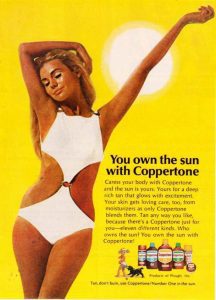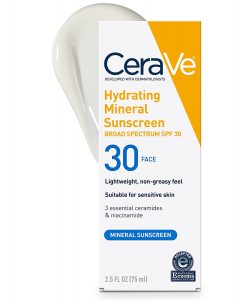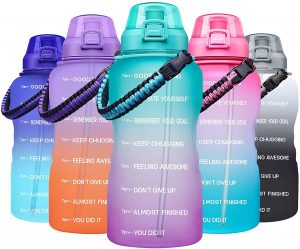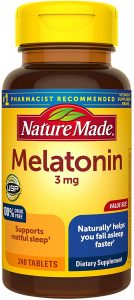Compliments are funny things. You never know what people pay attention to, and I’m often taken aback when I receive one.
The most frequent compliment I get is that I have beautiful skin, and it surprises me every time.
The compliment is usually followed by a query about how I do it. I figured it’s time to quit being surprised and share what I do; it’s not a secret, and it’s easy.
Sunscreen
I was surprised to learn that sunscreen was invented in 1938 by a Swiss chemistry student who was tired of getting sunburned when he climbed the Alps. As a child of the seventies, the only chemical sun protection I ever saw was on a lifeguard’s nose. Like many young women, my goal was to get as brown as possible and every summer, I spent a lot of time slathered in baby oil working toward that end. When it came to commercial sun products, the objective was to minimize burning only so that more time could be spent in the sun to achieve that coveted brown glow.
I can still hear my mother’s warning from the shade: “You girls are going to regret this later, when you are my age, and your skin looks like a piece of old shoe leather.” That comment prompted collective eyerolls from me and my sisters, but as usual, Mom was right.
Today, we’ve come a long way. Most people are aware of the damaging effects of too much sun exposure. The prevalence of skin cancers has also awakened many people to the urgent need to protect skin from the sun. The importance of protecting my skin from the sun’s damaging effects came on my radar around 1990.
And here’s my first tip: it’s not the once-a-year beach or ski vacation that is going to incur the long-term sun damage, it’s daily exposure. I have been wearing sunscreen, every single day, for the last thirty years. Putting sunscreen on any skin that is exposed is part of my regular morning skin care routine.
It’s important to remember that even if you are wearing a hat, the sun reflects up from surfaces, so still put on that sunscreen. You still need sunscreen unless your house has no windows (so everyone needs it). If you don’t believe me, look at anything that is exposed to light through a window; if it has color, it will fade over time.
Consistent daily use is the key. And I know, nobody wants to be sticky all day. There is no need to because there are so many well-made daily care products that include sunscreen. Try this one or find one that works for you.
P.S. The myth that people of color do not need sunscreen is false. Dr. Ife J. Rodney, founder of Eternal Dermatology and Aesthetics in Maryland, has a message for all of us: everybody, regardless of skin tone, should wear sunscreen daily.
Super tip: I always have sunscreen in my purse and keep a small tube of it in the car to put on my exposed arms and the backs of my hands when I’m driving.
Water
I still remember how surprised (and a little grossed out) I was to learn in sixth grade science that our skin is an organ. It’s our largest organ and made up of mostly water. Which makes my next tip the most obvious: drink a lot of water.
Well-hydrated skin is visibly healthier skin. Drinking plenty of water every day improves your complexion in a variety of ways, including fewer wrinkles and fine lines, reduced puffiness, smaller pores, faster healing, tighter skin, and all-body pH balance to help reduce acne.
So how much water should you drink every day? Well, everybody’s favorite answer, is that it depends. Many people are familiar with the 8×8 rule: you should drink eight 8-ounce glasses of water a day, or about 2 liters. But daily water needs also depend on other variables: environment, season, temperature, activity level, diet, and your health.
Bottom line: assess your daily circumstances, set a daily water intake goal, and then make water consumption a natural part of your day.
Super tip: If you have a hard time remembering to drink water throughout the day, set a series of alarms on your phone to remind you.
Proper diet
This one came late to me and was surprising. It wasn’t until I was older that I could see the effects of what I ate on my skin. Everyone has their downfall, and mine is sugar. I’ve grown pretty good about mindful sugar intake but if I have a day with a lot of sugar consumption, it shows up on my skin. The other culprits that affect your skin: caffeine, salt, and spices.
What food should you be eating to keep your skin healthy? There is a lot of research on this and opinions abound, so the short answer is to do your own research and see what works for you.
It is generally agreed upon, however, that vitamin-rich foods and fats that come from plants are beneficial for all-over health, especially your skin. Vitamin-specific shout-outs go to A, C, and E. One of the easiest ways I have found to managing a healthy diet is to eat by color.
I’m a big fan of the Eat This, Not That! Series. While reading a September 2020 article, 22 Foods That Will Immediately Improve Your Skin, According to Dermatologists, I noticed that the 22 foods that were listed—berries, watermelon, salmon, avocados, carrots, and dark chocolate, to name a few—were all rich in color as well as vitamins.
You really are what you eat. Try to eat all the colors in the rainbow. Your skin will love you for it.
Super-tip: I have found that if I keep up with drinking water, it helps reduce sugar cravings.
Exercise
At first blush, it might seem like exercise isn’t that great for your skin because most of us get sweaty and dirty during exercise. It is quite the opposite. The increase in blood flow and decrease in stress that result from regular exercise come with a host of benefits.
According to Austin-based dermatologist, Dr. Amy McClung, getting your blood moving nourishes cells, removing toxins from your skin and decreasing stress levels. This can prevent and reverse the signs of aging because when you are less stressed, so is your skin.
How much exercise do we need to see benefits to our skin? According to Dr. McClung, as little as 30 minutes of aerobic exercise each day can have dramatic effects on your skin.
Super-tip: Chasing your naked toddler through the house is an aerobic activity!
Sleep
Ah sleep. We all know we need more, but there are so many things that conspire against our getting enough. What busy mom hasn’t sacrificed sleep to get the things done that you can’t while the kids are awake?
With age, I have learned that getting enough sleep makes all the difference in how my day runs, and I am more reluctant to sacrifice sleep than when I was younger. And, just like too much sugar or not enough water, lack of sleep shows up on my skin.
Lack of sleep is the sneakiest of all the things that are detrimental to skin health. Without enough sleep, we erase all the things we’ve done during the day to keep our skin healthy. Turns out there is some truth to the notion of beauty sleep.
Sleep deprivation can decrease collagen production, moisture and pH levels, and blood flow; it can increase stress which elevates cortisol and inflammation levels. All of this can lead to uneven pigmentation, acne, reduced elasticity, fine lines, dark circles, pallidness, droopy skin…I think you get the picture. Sleep deprivation is not good for your skin.
Super tip: I am not a morning person. After years of resistance, I have recently started going to bed and waking up at the same time every day, even on weekends. I must reluctantly admit that I hate mornings slightly less, and I do feel better rested.




















